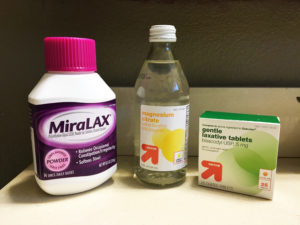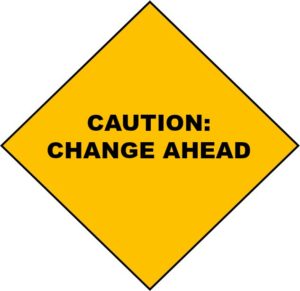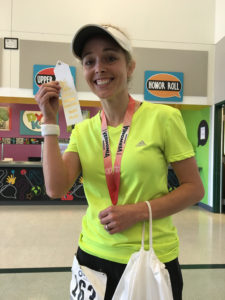May is Celiac Disease Awareness Month. Ironically, I’m getting tested for celiac on May 31st.
Running… Out of Energy
Here’s the back story, it’s a long one. A month or two ago, I blogged about feeling pretty tired and run down.
In December I began training for my 7th marathon in early April. As the months went on, I began feeling more and more fatigued. Running friends commented how they were getting stronger and faster. I wasn’t seeing the same results. In fact, sometimes during long runs, I began wishing I could stop and take a nap. I even ran a half-marathon in February… no PR (personal record), and felt very tired during the race.
Trying the Gluten-Free Diet
About a month before the marathon, I checked out a book from the library called The Gluten-Free Edge: A Nutrition and Training Guide for Peak Athletic Performance and an Active Gluten-Free Life. To be honest, I didn’t love the book, and it wasn’t written by a dietitian. But, I wondered if going gluten-free would restore energy during training.
It wasn’t just about my energy levels, there were other symptoms: diarrhea every day 2-3+ times for the past year and a half, seasonal allergies that seem to come earlier every year, watery eyes, daily joint pain (I blamed it on years of gymnastics), and chronic low Vitamin D despite vigorous supplementation.
I need to point out that I ADORE GLUTEN, any type of bread, pasta, cereal, crackers, or tortillas. I even make my own bread– my pizza dough is legendary! I knew it would be a real challenge to go gluten free. The first week I cut gluten by about half by swapping regular tortillas, cereal, and sandwich bread for gluten-free alternatives. By the second week I was 100% gluten free, albeit a little grouchy. Gluten-free products don’t taste the same!
How did I feel? It’s hard to tell. I felt a little stronger during training runs, and didn’t need to nap every afternoon. I had the first solid bowel movement I’ve had in a long time.
The Epiphany
After a few weeks on the diet, I had an epiphany:
I need to practice what I have been preaching to my patients for years… “Don’t go gluten-free without being tested for celiac disease first.”
Prior to my annual physical, scheduled for the week before my marathon, my primary care doctor drew labs and I asked her to “throw in” a celiac panel.
Side note: six years ago we learned from a Prometheus Celiac Plus lab test that our son was at high risk for celiac cisease. Earlier this year, I had some genetic testing through Nutrigenomix, which indicated I am also at high risk for celiac.
In 2010 my doctor ran a celiac panel which was negative. I think that’s why I was surprised when my labs came back “mildly positive.” UGH. What does that mean? I contacted a colleague of mine who works in a large celiac center in Boston. She consulted with a gastroenterologist specializing in celiac disease and he recommended that I be given both an endoscopy AND colonoscopy.
Why Is It Important to Get Tested Before Going Gluten-Free?
Several years ago I wrote about the difference between celiac disease and non-celiac gluten sensitivity, and the importance of getting tested before going gluten-free. I love this article titled: Six Reasons to Test for Celiac Disease Before Starting a Gluten-Free Diet by the Celiac MD, Amy Burkhart, MD, RD (a doctor and a dietitian, what a great combo!).
In essence, there is a huge difference between a diagnosis of celiac disease and non-celiac gluten sensitivity. Celiac disease is an autoimmune disease that requires 100% life-long adherence to a gluten-free diet with routine medical monitoring. Even gluten crumbs can cause intestinal changes and keep the immune system activated. Those with celiac disease who eat gluten increase their risk of other autoimmune disorders and certain cancers as well.
The “gold standard” for celiac disease is an endoscopy with a biopsy. After you are put to sleep, the gastroenterologist puts a small camera through your mouth into your esophagus, stomach, and into the first portion of your small intestine, where they take tiny samples of the tissue to send for pathology.
Why am I also getting a colonoscopy? It’s actually not connected to celiac disease. I have a family history of early colon cancer on one side of the family, and ulcerative colitis on the other. This test is just to be sure I don’t have either of those problems either.
When following a gluten-free diet for celiac disease, you MUST be fastidious about accidental gluten exposures, particularly through cross-contamination. As I have explained to patients and my own family, it’s the difference between scouring the restaurant for possible sources of cross-contamination, and just asking the waitress for a gluten-free bun for your burger.
Prep for Endoscopy/Colonoscopy
How have I been preparing? First of all, the day after my marathon, I started eating gluten again. This is called a gluten challenge. The idea is to eat gluten every day for the six weeks leading up to the procedure. If you avoid gluten before the endoscopy this can result in a “false negative”. The time and quantity of gluten consumed for a gluten challenge varies from doctor to doctor. There are many protocols: anywhere from two slices of bread for six weeks up to 3-4 slices of bread for 12 weeks.
In the meantime, I’ve been having my “last supper,” eating all forms of gluten, both at home and at my favorite restaurants. I’ve gone through many emotions over the past 5-6 weeks. I’m even grieving the potential loss of foods I never eat. (“What if I can’t eat an oreo again?”… even though I haven’t eaten a n oreo in years.)
n oreo in years.)
This week I began seven days of the prep diet: no nuts, seeds, popcorn, whole grains, vitamins, or minerals. Monday, while everyone else is having a barbecue and enjoying the holiday, I will be only consuming clear liquids and I will begin the process of completely clearing my intestinal tract.
I already purchased Miralax, magnesium citrate, and Dulcolax. They are on my bathroom counter, reminding me of next week’s procedure.
What’s Next?
After my endoscopy and colonoscopy, I will await the pathology results. Regardless of the outcome, there will be a lot of changes to my diet. As my doctor pointed out, my body doesn’t really like gluten. In all likelihood, I will need to go gluten-free, or at least gluten-reduced. The main question is: how careful will I need to be? Stay tuned.
Marathon Results
How was the marathon? I ran my best, but did not get the time I was hoping for. Despite that, I placed 3rd in my age group and missed my Boston Qualifying time by a mere 59 seconds.